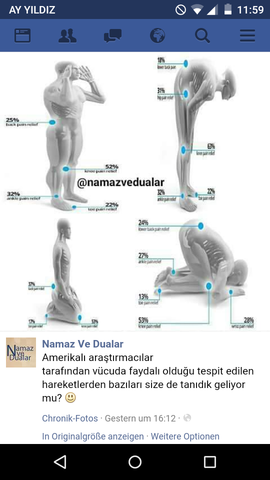Welche Bedeutungen stehen hinter den Gebetshaltungen im Islam?
qiyam, ruku‘, sadschda ...usw. Wieso macht man genau diese Bewegungen und nach der einer gewissen Reihenfolge? Haben die einzelnen Gebetshaltungen eine Bedeutung?
5 Antworten

ادم= Adem/Adam (rechts nach links wird es gelesen) der erste Buchstabe gilt für qiyam, der 2. für rüku und der dritte für sadschda...
Die Sünden lagern sich auf deine Schultern und bis zur Sadschda fallen sie dann weg.. Ist eine Bedeutung..
Und falls du mal beobachtet hast, sind diese Haltungen zeigen deine Bescheidenheit, Respekt deine Angewiesenheit gegenüber deinem Schöpfer.

Niederwerfung ist die höchste Form der Verehrung.
Hier erklärt Imam Ali (as) die beiden Niederwerfung im Gebet:
Aus ihr (der Erde) haben Wir euch erschaffen, und in sie werden Wir euch zurückkehren lassen, und aus ihr bringen Wir Euch abermals hervor. (Edler Qur’an 20:54)
Imam Ali (a.s.) erläuterte die Bedeutung der zwei Sadschda (Niederwerfung) in Jedem Raka' (Gebetsabschnitt) mit obigem Qur'an-Vers: Der Mensch legt zum ersten mal seine Stirn auf die Erde. Das entspricht der ersten Erschaffung des Menschen aus Erde. Dann richtet man sich von dieser ersten Niederwerfung auf zum Sitzen, das heißt, man tritt ins Leben ein. In der darauffolgenden zweiten Sadschda beruht die Stirn erneut die Erde und symbolisiert den Tod und wie man damit wieder zur Erde zurückkehrt. Dann richtet man sich von der zweiten Sadschda erneut auf und geht wieder aus der Erde hervor (Auferstehung am Tag des Gerichts), gemäß dem genannten Vers des edlen Qur'an.

Esselamu alejkum
Grundsätzlich dient das Gebet zum "anbeten " von Allah s.w.t .
Wenn man das Gebet analysiert unterwirft man sich Allah s.w.t immer mehr während einem Zyklus .
Zuerst steht man , dannach ist man im Rukkuh und letztendlich fällt man auf die Knie und mit der Stirn auf den Boden .
Dannach gilt es zu analysieren was man zu Allah s.w.t während einem Gebet sagt .
Man fängt an mit der Al-fatiha , aus einem Sahih hadith wissen wir das Allah s.w.t während dieser Zeit mit uns redet .
Hier wäre etwas dazu :
Al-Fatihah and Salah
Al-Fatihah is also called Salah, because it is itself a prayer and reciting it is a
condition for the correctness of Salah-The Prayer, as recorded by Muslim that
Abu Hurayrah (May Allah be pleased with him) said, that the Prophet (Peace be
upon him) said;
“Whoever performs any prayer in which he did not read Umm Al-Qur’an (Al-
Fatihah), then his prayer is incomplete.” He said it thrice. [1]
There is another hadith, narrated by Abu Hurayrah (May Allah be pleased with
him) that the Prophet (Peace be upon him) said; “Allah the exalted said, ‘I have
divided the prayer (Al-Fatihah) into two halves between Me and My servant. A
half of it is for Me and a half for My servant, and My servant shall acquire what
he asked for.
If he says, ‘All praise and thanks be to Allah, the Lord of existence’, **Allah says,
‘My servant has praised Me.’**
When the servant says, ‘The Most Gracious, the Most Merciful.’
Allah says, ‘My servant has glorified Me.’
When he says, ‘Master of the Day of Judgment.’
Allah says, ‘My servant has glorified Me.’
When he says, ‘You (alone) we worship, and You (alone) we ask for help.’,
**Allah says, ‘This is between Me and My servant, and My servant shall acquire
what he sought.’**
When he says, ‘Guide us to the straight path. The way of those on whom You
have granted Your grace, not (the way) of those who earned Your anger, nor of
those who went astray’,
**Allah says, ‘This is for My servant, and My servant shall acquire what he asked
for.’ ” [2]**
In the above hadith, the word Salah is used in reference to the Qur’an (Al-
Fatihah), which also testifies the importance of this surah and reciting it during
every prayer, in every rak’ah.
Al-Fatihah is not merely an introduction to Qur’an, rather it is a prayer from
man and the Qur’an is the answer from his Lord. Thus it has a relationship of a
prayer and a response. If a person is an earnest seeker after truth, and
recognizes that the Lord of the Universe is the source of all knowledge, then he
prays to Allah to show him guidance and Allah places the whole of the Qur’an
before him in answer to his prayer.
All praise is for Allah, the Sustainer and Cherisher of the Worlds. Al-Fatihah
starts with the praise of Allah, who is the Lord and Creator of this world and
the Hereafter. It states that all thanks and praise are due purely to Allah alone,
and nothing is to be worshipped except Him. He is the Sustainer and Owner of
all that He has created in both Alams (Worlds).
The Most Gracious, the Most Merciful. Ar-Rahman (Most Gracious) and Ar-
Raheem (Most Merciful) are two words of the same root Ar-Rahmah (the mercy).
One of them is softer than the other, meaning, it carries more implications of
mercy. Allah is Ar-Rahman for all humankind irrespective of their belief in
Allah, whether they are good-doers or evil-doers; they all obtain their
sustenance from Allah, this is because Allah is Ar-Rahman. Allah is also Ar-
Raheem for the believers in Him. They receive special blessings from Allah, that
is, happiness and contentment in this life and reward in the Hereafter.
Master of the Day of Judgment. After Allah describes that He is Ar-Rahman and
Ar-Raheem, He immediately gives a warning, that along with His mercy, He is
also the Master of the Day of Judgment. So that a person should not forget that
along with His mercy He is also Just.
You Alone we worship and You Alone we call on for help. After the person has
praised Allah and thanked Him, now he stands before Him, addressing Him
directly; O’ Allah our worship, obedience, submission and devotion is only for
You alone, and we only serve You. O’ Allah we know that You are the Lord of
the Universe and You have the power over everything, therefore, we only turn
to You for help, for our needs and requirements.
Guide us to The Right Way. i.e. Make us firm on the straight path and don’t let
us deviate. The straight path mentioned here and elsewhere in the Qur’an
refers to Islam. We already mentioned the hadith in which the servant
proclaims, ‘Guide us to The Right Way’ , and Allah says, “This is for My servant
and My servant shall acquire what he has asked for.
The Way of those whom You have favored. i.e. The servant prays to Allah to
guide him towards the straight path in every walk of life, and the path of those
upon whom You have bestowed Your mercy i.e. people who are obedient to
Allah and His Messengers.
Not of those who have earned Your wrath, or of those who have lost The Way.
A servant also prays to Allah, to help him avoid the path of those whom Allah is
angry with, whose intentions are corrupt and who know the truth, yet they
deviate. And also help us to avoid the path of those who were led astray. These
two paths are of Jews and Christians. ‘Not of those who have earned Your
wrath’, refers the Jews and “ or of those who have lost The Way” is for the
Christians.
After finishing Al-Fatihah, it is recommended to say Amin, which means, ‘O’
Allah accept our invocation’, for those who are not praying and strongly
recommended for those who are praying. As the Messenger of Allah (Peace be
upon him) said:
“ When any of you says in the prayer Amin, and the angels in the heaven say,
Amin, in unison, his previous sins will be forgiven.”[3]
[1] Sahih Muslim. [2] Sahih Muslim and Sunan An-Nisai. [3] Sahih Muslim 1:307.
Des weiteren sollte man beachten was man sagt während man im Ruku ist der zweit niedrigsten Position im Gebet "Subhane rabijel adhim " Gepriesen sei mein Herr der "adhim " ist vom Kontext her die superlativer des Wortes "ehrbar " ich finde im deutschen gibt es kein passendes Wort dafür , aufjedenfall drückt man damit aus das Allah s.w.t der ehrenhafteste ist der über alles erhabene .
Das sagt man während man sich vor Allah s.w.t verbeugt , man drückt damit aus wie sehr man Allah s.w.t ehrt wie sehr man anerkennt das man selbst alle Ehre zurücknimmt wenn es um Allah s.w.t geht .
Nun befindet man sich in der Sajdah am niedrigsten Punkt des Gebets man hat sich also vor Allah s.w.t so niedrig wie möglich positioniert und sagt währenddessen "Subhane rabbijel A'ala " Gepriesen sei mein Herr der Erhabene wobei das hier das Wort "Erhaben (A'Ala ) Allahs Höhe , Allahs position gegenüber den Geschöpfen beschreibt , es gibt die Sura Al-A'ala ( der allerhöchste ) würde man also das Wort "A'ala " wortwörtlich übersetzen müsste man das Wort "der hohe " was sinngemäß die Aussage dieses Satzes nicht trifft .
Also kurz gesagt "A'la " drückt eine Erhabenheit aus die mit "Höhe " Verbunden ist , ich hoffe ich konnte dir ansatzweise die Bedeutung dieses Wortes vermitteln .
Man sagt also während man selbst am niedrigsten Punkt vor Allah s.w.t ist das er geprieses ist in seiner Erhabenheit und seiner "Höhe " während man selbst vor ihm niedrig ist und keinerlei Erhabenheit hat .
Wenn man sich das Gebet also nun ansieht , "Erniedrigt / demütigt " man sich selbst vor Allah sw.t. immer mehr wobei ich finde dass das englische Wort "humble " diesen Akt besser beschreibt .

Amerikanische Forscher haben auch festgestellt, dass die Haltungen im Gebet positive Wirkungen erzeugen! SubhanAllah 💞


Etwas Ironie eines Deisten erlaubt ??
Danke sehr !
Ironie on:
Allah ist wie ein Computer... sofern Du die richtigen Tastenkombinationen eingibst, "wirkt" es ..
so alleine mit "reinem Herzen" und "guter Absicht" klappt das bei"Allah" nicht....
Ironie off
Vermutlich haben die Gebetshaltungen einen Sinn... und Allah darf wohl erwarten, dass man ihn korrekt anbetet..., oder ?
http://islamimherzen.de/portfolio/die-gebetshaltungen-im-islam-und-die-positiven-auswirkungen/